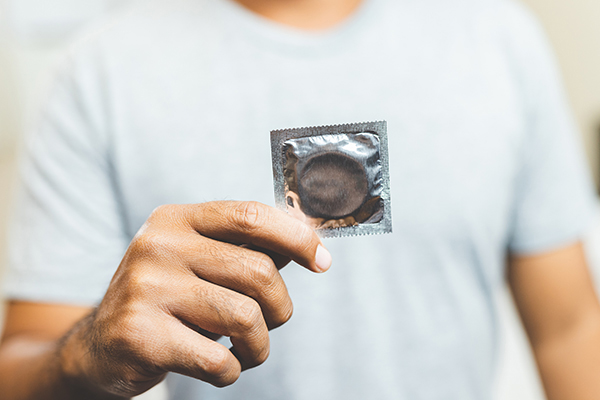Condoms are some of the most accessible forms of contraception. If used correctly, condoms are effective in preventing pregnancy by 98%. Latex and plastic condoms are also a viable defense against sexually-transmitted infections since they prevent skin, vaginal and seminal fluid transfer. Condoms are simple to use, portable and affordable. Yet despite the protections they offer, condoms also carry a few negative associations and can even be tied to erectile dysfunction. Below, we’ll discuss a type of ED that occurs specifically with condom use.
This specific type of erectile dysfunction is coined condom-associated erection problems or CAEP. It’s known to affect thousands of men around the world. A 2015 study found that up to 14% of men experienced CAEP when putting on a condom, while 16% of men said they experienced CAEP while having sex. Around 32% of men experienced both. It’s interesting to note that while most forms of erectile dysfunction are associated with older men, this study actually surveyed males between the ages of 18-24.
What causes condom ED?
There are four main reasons why a man may experience erection issues with condoms:
- The condom isn’t placed on correctly
- The condom fit is either too big or too small
- Anxiety can make men focus on the condom instead of sex
- Men become distracted with perceived loss of sensation
Luckily, there are many options to address CAEP. For starters, men should develop their condom skills. While it may seem like an obvious practice, most men are never properly taught how to put on a condom. Many tend to reach for a single condom size and brand and stick to it even with an improper fit. The wrong size is often what causes the loss of an erection during sex. Men are encouraged to experiment with different sizes, lubricated formulas and textures to find what feels good.
As noted above, anxiety and distractions can shift focus away from sex and many men become fixated on the condom instead. In order to curb feelings of anxiety, it’s recommended to practice and practice again, just like you would to improve your speed on a mile run. If you’ve been having sex for some time, then you may feel like you have a handle on it. However, you may find yourself fumbling with opening and slipping on a condom for far too long which causes a loss in erection firmness. Instead of spending a few minutes slipping on a condom (which can feel a lot longer than that), practice and have the condom ready for your fastest “run” yet.

Alternatively, you can fold in the condom as part of foreplay. Have your partner place the condom on you while you kiss and stimulate each other. The condom will already be on when you’re ready to have sex or ask your partner for a sensual massage while you focus for a few seconds on putting on the condom. Men can also seek sexual therapy or introduce Eddie by Giddy, into their sex lives. Eddie is an innovative erectile dysfunction device worn at the base of the penis. It won’t interfere with a condom and it’s a natural way to tackle ED, including CAEP.
It’s important to communicate with your partner about condom use. If you and your partner have both been recently tested for STD's and you’re both comfortable doing so, then alternate forms of pregnancy prevention may be another viable option. Remember that sex isn’t like it’s portrayed in the media. There can be awkward stumbles and temporary losses of arousal. Take your time and find what works for you. If you and your partner are transparent about protection and potential insecurities, this level of emotional intimacy will make way for matched physical intimacy.
Legal Disclaimer: We appreciate you taking part in the discussion about sexual health and wellness. Because we include information about medical conditions and treatments, please note the following: Information provided on this site is for general informational purposes only. Any information provided here is not for the purpose of diagnosing, treating, curing, mitigating, or preventing any type of disease or medical condition. Before beginning any type of treatment regimen you should always seek the advice of your licensed healthcare professional.
And remember, if you think you have a medical emergency, call your doctor or 911 immediately.
All information on this site is provided in good-faith, however, Giddy Holdings, Inc, and its agents and employees, make no representation or warranty of any kind, express or implied, regarding the accuracy, reliability, or completeness of this content. Under no circumstances shall we assume any liability to you for any loss or damage of any kind incurred as a result of the use of this site, or the reliance on any information provided herein. Any application of the material provided here is at the reader’s sole discretion and responsibility.







